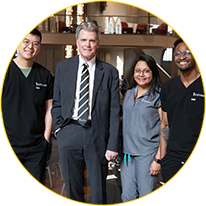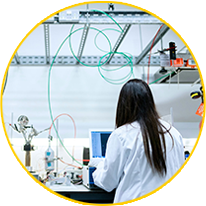contact
F 410-706-3214
Office hours are 8am - 5pm Monday through Friday.
Click on the button above to update your contact info with the School of Dentistry and receive alumni news.
Dr. Joseph Davidson, DDS ‘70

“If I hadn’t been accepted right away, I might have applied someplace else, but I got accepted by the dental school on my first try so it all worked out,” he said.
Dr. Davidson's relationship with the school has proven to be mutually beneficial and intertwined.
“Based on my experiences at the dental school, after my wife and I are gone, we will be leaving a significant amount of money to the Joseph and Elly Davidson Student Patient Help Fund,” he explained. “While working in the Emergency Department, I observed that patients would need, for example, a root canal and a crown, but unable to afford the work. This fund will allow such a patient, if qualified, to receive a grant. It will be a triple win because it helps the patient, who gets the dental care, it helps the dental student, who provides the care, and it helps the dental school, which gets the money for the procedure.”
“This has really added purpose to my life and in a way, I feel like it is the most important thing I’ve done,” he added. “No one appreciates the thought of being dead but as I get older and become more philosophical about it, it gives me some comfort to know that I might have an effect on people’s lives after I’m gone.”
After graduating from UMSOD in 1970, Dr. Davidson left Maryland for three years, first for an internship in Philadelphia and then for two years at Fort Devens in Massachusetts at the end of the Vietnam War. When he returned to Maryland in 1973, he opened a private practice office in Columbia and had that until 2004, when he thought he would be retiring. Ultimately though, his career would lead him right back to the place where it all started.
“A year before I retired, a student at the dental school asked if she could do an internship with me, but in order to mentor an intern you have to become part of the Dean’s Faculty,” he said. “So I went through that process, I got approved, she had the internship, and things went great, and then I retired shortly after that because I developed what’s called an essential tremor, which is not good if you’re a dentist and your hand is shaking a lot.”
However, a year after retiring, the school called to ask if he could take on another intern, and when he explained why he could not, they offered him a position at the school instead. When he explained it would need to be a position where he would not have to use his hands, he was offered a position in what is now known as the Department of Oncology and Diagnostic Services.
“In my department my responsibility was to help diagnose pathology and review medical histories to ensure the safety of the patients during and after care.,” Dr. Davidson said. “I did that until 2012 when Dean Stohler asked me if I could begin to handle complaints, so for three years I handled complaints at the dental school and then in 2015 I turned 70 and retired for real.”
In addition to the success, he found in his professional career, Dr. Davidson also has the dental school to thank for a large part of his personal life.
“I met my wife at the dental school while I was a student there,” he said. “She was working at what was then called the Department of Community Dentistry as a secretary and we got married in 1969, just before the start of my senior year.”
The dental school has been a huge part of my life. It educated me, provided me with what I needed to have a great career and make a comfortable living. It also is where I met my wife and provided me with post-employment after I left my practice. The school is indeed my true Alma Mater!"
After finding professional success and personal happiness via the school, he and his wife are leaving a legacy with the Student Patient Help Fund. What is his message to the students of today?
“Make the most of your education,” he said. “Work hard at it. Things that you don’t think you’re interested in, things that you never even dreamed about, you might become very interested in. Take advantage of the time that you’re there, be true to your family and to your patients, and remember your alma mater in the long run.”
“And if during your time here you are able to take advantage of the Student Patient Help Fund, maybe in the future you can contribute a little bit to it in order to pass the favor forward,” he added.





